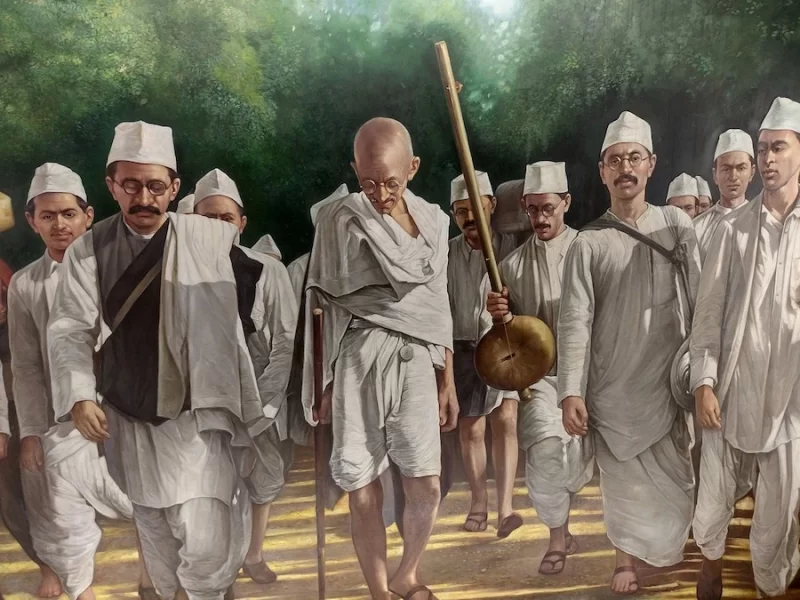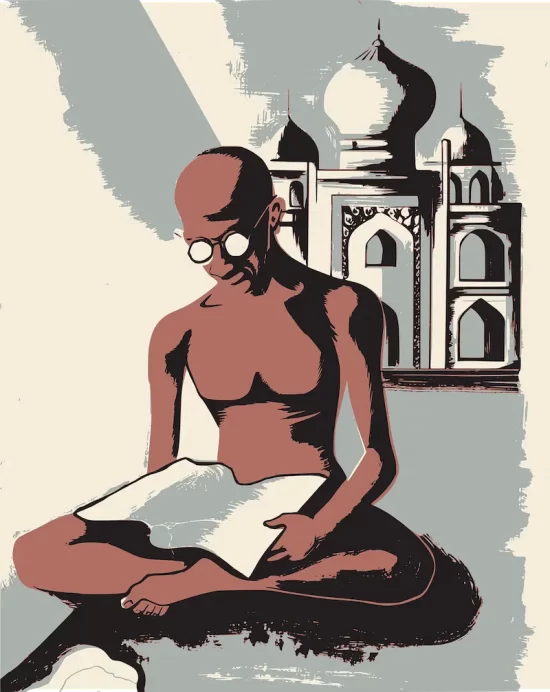Table of Contents
In our rapidly evolving and dynamic world, it’s crucial for individuals to pause and reflect on their priorities, rather than simply following the crowd. In this article, we’ll delve into seven timeless lessons from Mahatma Gandhi that continue to hold immense relevance in the modern world. These teachings can be effectively incorporated into our lives for personal growth and improvement.
1st Lesson – Peaceful Stand
Today, The world seems to be more divided than ever. And things could turn worse in the future if it continues to do so. But if we could understand Gandhi’s philosophy and his example, maybe we could prevent the conditions from getting worse.
Gandhiji had the philosophy of non-violence which inspired several moments not just in India but across the world. He believed in peaceful discussions because aggression can never bring a sustainable result in the long run. Be it a war between two countries such as Ukraine vs Russia, Or a fight between religious supporters. We should always question ourselves, what will be the outcome of the entire drama? Somewhere in your mind, you will know the answer.
So If we take a reference to Gandhiji’s Non-Violence philosophy we could choose to show our stand in a peaceful way. The world is a diverse place with diverse mentality. It’s not necessary that everyone will agree with one point, but a peaceful stand is always a healthy one.
Examples of peaceful moments in today’s time are very rare. But mostly you can see on sports grounds where players showcase a peaceful protest with a black ribbon.
2nd Lesson – Forgiveness
Mahatma Gandhi once wisely remarked, “An eye for an eye only ends up making the whole world blind,” and these words hold profound meaning even in today’s world.
Our planet is already burdened with an overwhelming list of problems that are unbearable. In such challenging times, it’s essential to recognize that the journey towards peace begins within oneself. So if you don’t learn to forget and forgive you will never break the barrier of revenge and save the world from dying.
However, this doesn’t imply that one should passively accept every injustice that comes their way. Instead, the key lies in learning from these experiences and gaining a deeper understanding of the situations we encounter. This understanding enables personal growth and empowers us to become better individuals.
3rd Lesson – Humanity / Empathy / Sympathy
Mahatma Gandhi consistently extended respect and equality to all individuals, regardless of their origins or backgrounds. This quality is exceptionally relevant in today’s world, which often seems plagued by hatred and division.
It’s crucial to remember that our shared humanity is of paramount importance and defines us as humans.
Furthermore, the concept of empathy is vital. It encourages us to see things from another person’s perspective and understand their experiences and feelings. Gandhi was a shining example of this, as he consistently assisted and empathized with others, striving to comprehend their unique viewpoints. Often, we become absorbed in our own challenges and discomfort, neglecting to consider how others might be coping with similar issues.
Gandhi’s willingness to help individuals outside his own community or group is another noteworthy trait. While sympathy can sometimes be exploited for personal gain in today’s world, it’s essential to exercise discernment and compassion toward those in need.
4th Lesson – Strength of Determination / Dedication / Perseverance
In today’s world especially for the younger generation, it’s very easy to get caught up in the rat race that ends up killing the true goals and compassion of life. Instead, our lives should reflect our principles and values.
Discovering what truly matters in life involves evaluating what brings us the most contentment and purpose. Mahatma Gandhi, for instance, abandoned his law career, which he had practiced for over two decades, to devote himself to public service.
Regardless of where we find ourselves in life, it’s never too late to pursue our genuine sources of satisfaction and remain committed to our life goals. This requires a blend of determination, dedication, and perseverance—an essential combination for achieving anything in this world.
5th Lesson – NonAttachment
In his Autobiography, Mahatma Gandhi talked about how he learned to let go of being too attached to material things and instead focus on what truly matters. He believed that holding onto things too tightly only leads to unhappiness.
This idea is very important in today’s world. Whether it’s being too attached to expensive gadgets like an iPhone or being overly dependent on someone, it usually ends up making us unhappy. It’s better to believe in yourself because you are the most important person. Other things in your life become more valuable when you feel valuable yourself.
Think of it like fashion – it’s not just about the clothes you wear, but how confident and comfortable you feel in them that matters the most.
6th Lesson – Mental Stability
We often face many distractions in our daily lives, from our workplaces and homes to our phones, laptops, and the people around us. These distractions can make it challenging to concentrate and find inner peace, which can affect our mental well-being.
Mahatma Gandhi, however, found a way to stay grounded and less affected by these distractions through the practice of Yoga and Meditation. He began his day with meditation and devoted several hours each day to practicing Yoga.
It’s safe to say that yoga and meditation played a substantial role in shaping his personality and ideals.
7th Lesson – Life means an ongoing journey Growth
Mahatma Gandhi’s life shows us that we can always become better people. It doesn’t matter how old we are; there’s always a chance to improve. We should never stop learning and growing as individuals. It’s like a journey where we keep getting better, just like Gandhi did throughout his life.

Hope you apply this learning in your life as well. And don’t forget to checkout
Why is Princess Diana remembered, and loved even today?











